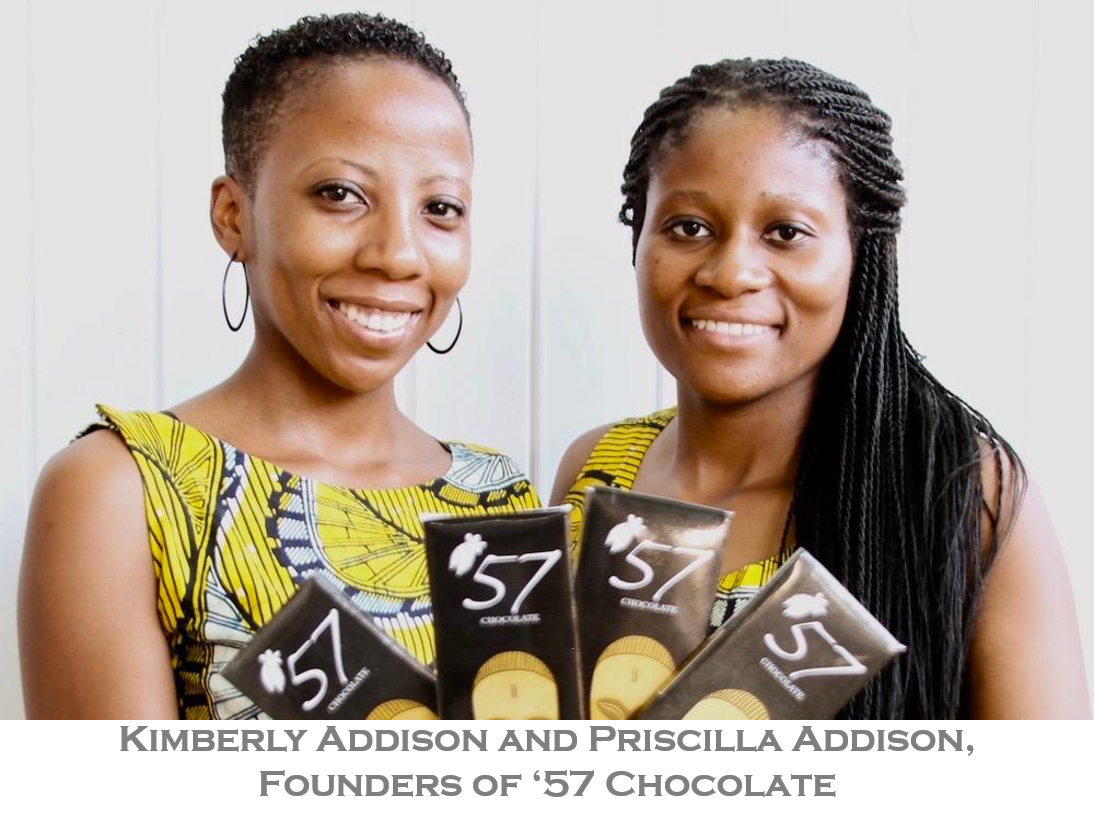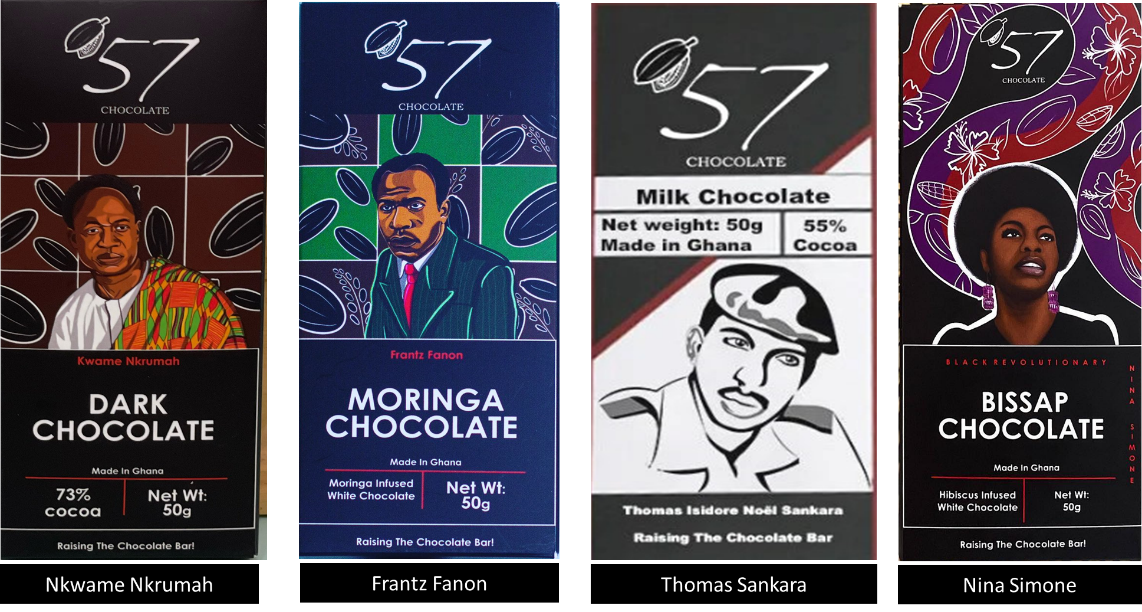‘57 Chocolate: A gourmet delicacy and a cultural immersion
Andy Kwabena Kwaku, Franckfurt-Am-Main, Germany
January 15, 2024
The trail blazing journey started in 2016. The brand ‘57 Chocolate is a story of passion, entrepreneurship, gourmet experience, steeped in history and culture. Sisters Kimberly Addison and Priscilla Addison developed a taste for chocolate when they lived in Switzerland. Kimberly says she fell in love with the art and science of chocolate making when she went on a factory tour at Cailler, one of Switzerland’s largest chocolate factories. Priscilla discovered she had the same passion. Years later, this experience led to the creation of ‘57 Chocolate, a pioneer beans-to-bar chocolate company in Ghana. The company turns dried cocoa beans into luxurious chocolate and confections. One ambition of the founders is to make products that are a reflection and celebration of African art and culture.

© 57chocolategh.com
Chocolate making in Ghana
Ghana is the world’s second producer of cocoa, with a market share estimated at 20 percent. However, Ghana exports raw cocoa with limited or no value addition. The global chocolate market was worth US$110 billion in 2022, with forecast projecting that the market will reach US$126.3 billion by 20271. Ghana captures less than 5 percent of these revenues. This is because Ghana processes less than 34 percent of the country’s cocoa beans into finished or semi-finished products. Ghana is not alone in this situation. Neighbors Cote d’Ivoire, Nigeria, and Cameroon also exhibit this economic paradox. Researchers from the International Management Institute (Kolkata, India) purport that Ghana does not have ‟a competitive advantage in the production of chocolate”2.
The founders of ‘57 Chocolate explain that Ghana’s dependence on imported inputs makes the domestic chocolate industry uncompetitive. These inputs include sugar, milk powder, nuts, and flavors. Kimberly and Priscilla told the online culinary magazine “saveur.com” that there is ‟stigma against Made-in-Africa products”. One of their mission is to ‟change the narrative that premium chocolate only comes from the Western countries”and also,‟change people’s perceptions and prove that high quality can come out of the continent”.
They went on to explain that‟our passion is to inspire the people of Ghana, especially the youth”. Young people have the capacity and knowledge to transform the country’s natural resources of Ghana and create premium products made in Ghana.
The products portfolio is a history book
‘57 Chocolate aspires to become a pan-African company. The company’s products, logos, and identity carry this ambition. Consuming ‘57 Chocolate products is a cultural immersion.
Each product seeks to educate the world about African art and culture. The packaging design serve this purpose. Adinkra symbols adorn the chocolate bars and retrace Ghana’s cultural heritage and values. Other products features women and men who have played important roles in the history of Africa and Black people across the world. Nina Simone, Frantz Fanon, Thomas Sankara and, of course, Nkwame Nkrumah feature prominently.

© 57chocolategh.com
‘57 Chocolate offers a palette of signature chocolate bars and confectionaries, that are not mass produced. Instead, each product is hand crafted in small batches to ensure high quality 4. In 2022, the company produces six signature flavors. These include the 73 percent-dark chocolate, the 55 percent-milk, and the white, mocha latte (coffee flavor). Other original brands include the Bissap (hibiscus flavor) and Moringa chocolate. The company says that the brands contain no preservatives, no additives, and no artificial ingredients. Company communication and marketing stress the fact that their products have high cocoa content, low sugar and less milk.
What makes Chocolate ‘57 special?
Ghana has over 50 small family-owned chocolate making companies. But the distinct identity crafted by the founders of ‘57 Chocolate, makes the company stand out from the rest. This starts with the cryptic number ‘57, which actually represents the year Ghana gained independence (1957) from the United Kingdom. This figure has a political meaning. Ghanaians and Africans see 1957 as the year that started a series of irreversible events across the continent. After centuries of domination and subjugation, Ghana’s declaration of independence lifted caps to individual and collective achievements for Africans. ‟It is a call and reminder that sometimes, in order to go forward, we need to look back at our foundation–our roots”, the sisters declared in an interview at the Ghana Investment Promotion Center (GIPC) on June 07th 20225.

Ghanaian youth have access to the internet and to social media. They know that global chocolate brands contain cocoa from their country. This awareness is leading them to a search for a connection with what they consume. This is also the case with African buyers of ‘57 Chocolate products in the diaspora. For this reason, the company targets the youth, to raise awareness and also to tap into a rising new consumer group, which has a desire for chocolate and also new shopping habits.
Resilience in a challenging business environment
Despite their remarkable journey so far, ‘57 Chocolate continues to face complex challenges. For example, access to finance for business expansion and for the acquisition of modern equipment is a major hurdle. The company needs modern chocolate making machines, temperature-controlled and insulated shipping equipment. The average commercial bank lending rate was 35.85 percent in 2022, according to the Bank of Ghana. Such high rates penalize small and medium size businesses like ‘57 Chocolate.
Despite these difficult business conditions, the company has been able to extend outreach to overseas markets. The products are available in the USA, Europe (Germany, France, and the United Kingdom) and Japan. They are also available via online orders. In the efforts to expand the marketing network, the company must factor in high shipping costs from international courier companies.
At home in Ghana, challenges include the lack of qualified human capital and training in chocolate making. The sisters say that the country needs official training centers for individuals working in cocoa and chocolate, as well as the capacity to produce manufacturing inputs for chocolate making. Since its inception, the company contniues to depend on import for these inputs. It must manage exposure to exchange rate volatility and risks stemming from any turbulence in the supplying countries.
Related Articles
BIBLIOGRAPHY
BIBLIOGRAPHY
1❩ https://medium.com/@edwardscott2090/cocoa-and-chocolate-market-size-share-growth-opportunities-and-leading-players-c3ca766708de
2❩ Jashim Uddin Ahmed et al. (2022): ‘57 Chocolate: Entrepreneurial Initiatives to Revive Ghana’s Chocolate Market
International Management Institute,Kolkata - https://journals.sagepub.com/ doi/pdf/10.1177/2516600X221100911
3❩ Sophie v. Huellen and Fuad M. Abubakar (2021): Why Ghana doesn’t get the full value of its cocoa beans, and how this could change - https://theconversation.com/why-ghana-doesnt-get-the-full-value-of-its-cocoa-beans-and-how-this-could-change-158773
4❩ https://www.lionessesofafrica.com/blog/2020/7/5/kimberley-and-priscilla-addison- pioneers-of-artisanal-bean-to-bar-chocolate-manufacturing
5❩ https://www.gipc.gov.gh/wp-content/uploads/2023/04/ Diaspora-Spotlight-57-CHOCO.pdf
